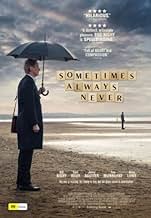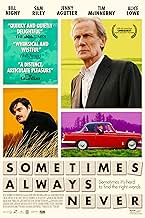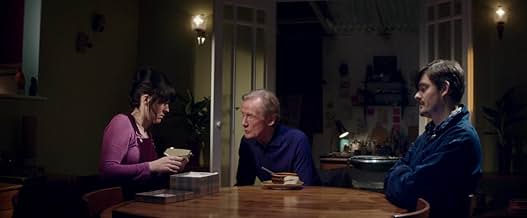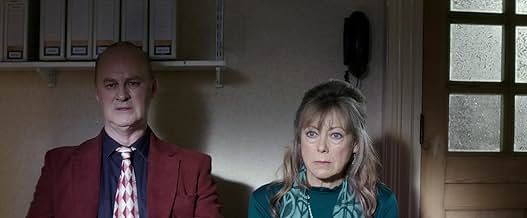VALUTAZIONE IMDb
6,3/10
3492
LA TUA VALUTAZIONE
Un dramma poliziesco in cui l'amore per le parole aiuta un padre a riconnettersi con il figlio scomparso.Un dramma poliziesco in cui l'amore per le parole aiuta un padre a riconnettersi con il figlio scomparso.Un dramma poliziesco in cui l'amore per le parole aiuta un padre a riconnettersi con il figlio scomparso.
- Regia
- Sceneggiatura
- Star
- Premi
- 1 vittoria in totale
Recensioni in evidenza
Despite the rather grim topic, the film manages not to be overly sad. In fact it is an enjoyable journey of a father who becomes obsessed with scrabble in order to cope with his loss. It is a good psychological portrayal pf grief.
Just to address the marmite topic brought up by another reviewer: It was illustrated in the film that Billy Nighy's character Alan was not a reliable story teller. He liked to tell tall tales, like the one about the grandmother with the coal seam in the basement.
Going back to the movie, I thought it was quirky like everyone mentioned. I knew it wasn't going to be a straight forward dramedy based on the bizarre, artificial riding in car scenes. It looked like it was done in a 1950s B movie style.
Thankfully the movie dials back on that and delivers a fairly straight forward, drama comedy framed around the game of scrabble, but really about Alan and his son Peter, as they try to solve the mystery of the missing son Michael. The body viewing scene (which we don't see) was particularly odd, because we were told that Michael went missing many many years ago when he and Peter were still children. So why would they be called to identify a body? If it was an adult's body, how would they know it was him. Usually they do DNA tests anyway.
Other than that weird start, and some scene involving a boat (or did it?), much of the movie follows a fairly linear format. I think it helps that every character in the movie had something to offer the movie, and generally everyone was likeable. You kind of hoped there would be a resolution of the 'mystery', but ultimately it didn't really matter. Nothing is really 'solved' by the ending, except maybe Peter wasn't as resentful of his missing brother's 'Prodigal Son' stature, and maybe Alan realized it was time to focus on his existing family.
I loved the movie. Bill Nighy is superb in anything he does, the rest of the cast were wonderful. It was written with humour, wittiness with a hint of sadness.
A single delicious narrative conceit drives the delightful Sometimes. Always. Never. (2018). It takes its own sweet time getting there, but when it does, it hits home: you can be an expert in words and their rules but be incapable of meaningful expression. Add a Scrabble obsession, mix it with deep grief and guilt, and you have a portrait of a family desperately unable to communicate with each other.
The simplicity of the plotline stands in stark contrast to the complexity of its themes. Dapper rule-bound tailor Alan (Bill Nighy) is told that the body of his long-missing son Michael may have been found. He takes his younger estranged son Peter (Sam Riley) with him to identify the body, and at the morgue they meet other parents who are there for the same reason. It's a diversion that does little to advance the narrative, but it does provide comic respite from the pain of loss. Both relieved and disappointed with the outcome, Alan invites himself to stay with Peter and his family in the hope of reconciliation.
With a threadbare plot, the power of this film comes from its theatrical settings, intelligent banter, and Nighy's trademark whimsical mannerisms and stylised performance. The label 'fantasy drama' has been applied to this film but is mis-leading and manifestly inadequate. If there is an element of fantasy, it derives from the way many scenes are played out against backgrounds that are have a surreal, even an absurdist two-dimensional feel that resembles a theatre set. Like all absurdism, there is an artful space between the underlying emotional intensity and the futility of ever trying to understand it. The gravelly Nighy is a master of under-statement, with a unique talent for giving shallow dialogue depth and humour. It's all about contrasts: Alan's obsession with a missing son and neglect of the son he still has; his fastidious Dymo labelling of everything as a substitute for control in his world; and his ability to make light of the heaviest emotions.
If you are not a Nighy fan or prefer action-based stories, you may find little to appreciate in this film. In place of a forward-moving narrative it offers a portrait of a dysfunctional family torn apart over guilt and the inability to emotionally connect. The film's title is itself a parody of form over function, referring to the tailor's rule for how jacket buttons should be fastened: the top always, the middle sometimes, the bottom never. With no substantive relationship to the film's content, it's a rule as good as any on how to live one's life.
The simplicity of the plotline stands in stark contrast to the complexity of its themes. Dapper rule-bound tailor Alan (Bill Nighy) is told that the body of his long-missing son Michael may have been found. He takes his younger estranged son Peter (Sam Riley) with him to identify the body, and at the morgue they meet other parents who are there for the same reason. It's a diversion that does little to advance the narrative, but it does provide comic respite from the pain of loss. Both relieved and disappointed with the outcome, Alan invites himself to stay with Peter and his family in the hope of reconciliation.
With a threadbare plot, the power of this film comes from its theatrical settings, intelligent banter, and Nighy's trademark whimsical mannerisms and stylised performance. The label 'fantasy drama' has been applied to this film but is mis-leading and manifestly inadequate. If there is an element of fantasy, it derives from the way many scenes are played out against backgrounds that are have a surreal, even an absurdist two-dimensional feel that resembles a theatre set. Like all absurdism, there is an artful space between the underlying emotional intensity and the futility of ever trying to understand it. The gravelly Nighy is a master of under-statement, with a unique talent for giving shallow dialogue depth and humour. It's all about contrasts: Alan's obsession with a missing son and neglect of the son he still has; his fastidious Dymo labelling of everything as a substitute for control in his world; and his ability to make light of the heaviest emotions.
If you are not a Nighy fan or prefer action-based stories, you may find little to appreciate in this film. In place of a forward-moving narrative it offers a portrait of a dysfunctional family torn apart over guilt and the inability to emotionally connect. The film's title is itself a parody of form over function, referring to the tailor's rule for how jacket buttons should be fastened: the top always, the middle sometimes, the bottom never. With no substantive relationship to the film's content, it's a rule as good as any on how to live one's life.
First off, the catchy title is simply a reference to guidance wearing a 3-button suit coat, sometimes the top button, always the middle button, never the bottom button. The main character is a tailor, he gives the advice to his teen grandson
Bill Nighy is Alan, Scrabble fan with two adult sons, and a teen grandson. One son, Michael, is missing, apparently he got up from a Scrabble game and left, they never heard from him again.
Several times the script references the Biblical prodigal son story, the one son who remained connected feels he isn't getting the love he deserves and all dad cares about is finding the missing son.
The story is a family relationship drama but sprinkled with humor. Bill Nighy makes it a worthwhile movie, all the other characters could have been played by almost anyone. However it was also good to see Jenny Agutter in a small role, she was mid-60s during filming, who could forget her performance in "Walkabout" when she was still a teenager?
I watched this on Amazon streaming movies.
Bill Nighy is Alan, Scrabble fan with two adult sons, and a teen grandson. One son, Michael, is missing, apparently he got up from a Scrabble game and left, they never heard from him again.
Several times the script references the Biblical prodigal son story, the one son who remained connected feels he isn't getting the love he deserves and all dad cares about is finding the missing son.
The story is a family relationship drama but sprinkled with humor. Bill Nighy makes it a worthwhile movie, all the other characters could have been played by almost anyone. However it was also good to see Jenny Agutter in a small role, she was mid-60s during filming, who could forget her performance in "Walkabout" when she was still a teenager?
I watched this on Amazon streaming movies.
Lo sapevi?
- QuizThe film is based on a short story called Triple Word Score, written by the script writer Frank Cottrrel Boyce.
- BlooperWhen Alan claims that "jazz" is a high-scoring word in Scrabble, a character corrects him by stating it's impossible to play since there's only one Z tile in the set. In reality, this word is indeed playable using "wild card" tiles. If using J, A, and Z tiles and a wild card tile in place of the other Z, the word would be a high-scoring word worth a minimum of 19 points.
- ConnessioniFeatured in Projector: Sometimes Always Never (2019)
- Colonne sonoreSometimes Always Never
Written by Edwyn Collins and Sean Read
Performed by Edwyn Collins, Sean Read and Chay Heney
I più visti
Accedi per valutare e creare un elenco di titoli salvati per ottenere consigli personalizzati
- How long is Sometimes Always Never?Powered by Alexa
Dettagli
- Data di uscita
- Paesi di origine
- Sito ufficiale
- Lingua
- Celebre anche come
- Triple Word Score
- Luoghi delle riprese
- Aziende produttrici
- Vedi altri crediti dell’azienda su IMDbPro
Botteghino
- Lordo Stati Uniti e Canada
- 39.191 USD
- Fine settimana di apertura Stati Uniti e Canada
- 2599 USD
- 14 giu 2020
- Lordo in tutto il mondo
- 1.417.047 USD
- Tempo di esecuzione1 ora 31 minuti
- Colore
- Proporzioni
- 2.35 : 1
Contribuisci a questa pagina
Suggerisci una modifica o aggiungi i contenuti mancanti































